Akva signs $64 million salmon smolt contract with Cermaq, its largest ever in Norway
The aquaculture equipment and technology supplier said the deal is its largest contract in Norway ever.

The aquaculture equipment and technology supplier said the deal is its largest contract in Norway ever.
